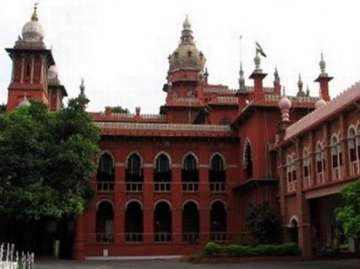Man gets three-month imprisonment for foul language against magistrate, aspersions on sessions judge
Justices PN Prakash and B Pugalendi, on their own, directed that the man be taken into custody and lodged in the nearest central prison for serving the sentence, and disposed of his petition.

The Madras High Court bench here has sentenced a man to three months of simple imprisonment for using foul language against a judicial magistrate in a representation and casting aspersions on a sessions judge.
Justices PN Prakash and B Pugalendi, on their own, directed that the man be taken into custody and lodged in the nearest central prison for serving the sentence, and disposed of his petition.
The judges said the court would not take such assaults on its staff lying down.
They opined that using foul language against a judicial officer would not only demoralise him, but indubitably interfere with the due course of justice by instilling fear in his mind.
"Once the emotion of fear afflicts a judicial officer, he will not be able to discharge the responsibility of administering justice.
"Honour is the bedrock of human life and if that is unjustly annihilated, what remains is only a living corpse," the judges said.
If a disgruntled litigant was allowed to go scot-free even after addressing a judicial officer in such language, the latter would not be able to command respect in his court from litigants and other stakeholders, they added.
All this would hamper the administration of justice, the court said.
The judges referred to the petitioner's attitude of not even feeling remorse about his comments on the lower court judges and said the high court had a solemn duty to protect and safeguard the judicial officers of the subordinate judiciary against such "brazen attacks" by disgruntled litigants.
"Our judicial set-up is akin to a Hindu undivided joint family, where the 'kartha' is the Supreme Court, the eldest brother is the high court and the younger siblings are the courts subordinate to the high court," they said.
A clear message should go to one and all that the eldest brother would brook no such vituperative insult to his younger siblings and that the high court would feel the pain of the hurt suffered by them, the judges said.
"We will be showing misplaced sympathy if we treat elements like this person with kid gloves, as that will embolden others to mount such attacks on defenceless subordinate judicial officers, who are not clothed with any power under the Contempt of Courts Act to rein in such attackers," they said.
Manoharan was convicted and sentenced to three years of rigorous imprisonment by the judicial magistrate, Rajapalayam, in a case registered by the police on a complaint from a soldier.
The petitioner had a civil dispute with the soldier. A quarrel had taken place between the two when the petitioner allegedly exposed himself while the soldier was sitting with his wife in front of his house and also misbehaved with his daughter.
The police had registered a case against Manoharan under the Tamil Nadu Prohibition of Harassment of Women Act.
After considering the evidence on record and hearing both sides, the judicial magistrate sentenced the petitioner to undergo various terms of imprisonment.
Manoharan then moved the sessions court in Srivilliputhur, headed by judge Ganesan, who said his petition was not maintainable.
The judge did not number the petition, but posted it before the high court to decide the issue of maintainability.
The petitioner, who came to know about this, sent a representation to the chief justice of the Madras High Court, the president, the prime minister and the Tamil Nadu chief minister.
In his representation, he used foul language against the judicial magistrate and alleged that he had killed justice, besides casting aspersions on the sessions judge.
The chief justice ordered initiation of criminal contempt action against Manoharan and the matter was placed before the advocate general for consent under the Contempt of Courts Act.
Manoharan, in his petition, sought to justify his act by contending that the magistrate had colluded with the soldier to convict him "illegally".